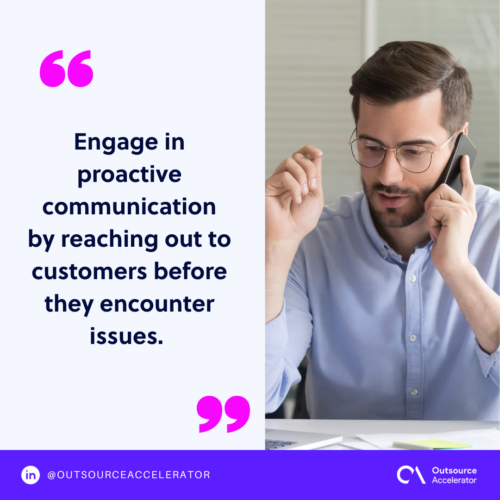Your guide to after sales customer service

In business success, customer service doesn’t end at the point of sale. Aftersales customer service emerges as a vital element
Aftersales customer service contributes not just to immediate customer satisfaction but also to the long-term success of any business.
In this comprehensive guide, we’ll explore the details of after sales customer service, its benefits, key elements, effective strategies, and some future trends.
What is after sales customer service?
Aftersales customer service refers to the assistance and support provided to customers after they avail your products and/or services.
It involves addressing their queries and ensuring their satisfaction with the product or service post-sale.
Khoros reported that 83% of shoppers identified excellent customer service as the primary factor influencing their purchase decision when buying a product.
Benefits of using after sales customer service
Here are the benefits of using after sales customer service:
Customer retention
Aftersales service plays a pivotal role in retaining customers by addressing their concerns promptly and effectively.
When customers feel valued and supported post-purchase, they return for future transactions.
Brand loyalty
Exceptional after sales customer service goes beyond resolving issues; it fosters a profound sense of loyalty among customers.
This leads to increased customer loyalty, as individuals are more inclined to return due to the positive experience they received.
When businesses demonstrate a commitment to customer satisfaction beyond the initial purchase, it strengthens the bond between the customer and the brand.
Catering to existing customers through after sales services strengthens relationships, generates repeat business and positive word-of-mouth referrals, contributing to sustainable growth and reputation in the industry.
Positive reputation
A positive reputation is paramount in the age of online reviews and social media.
Aftersales service contributes significantly to building and maintaining a favorable brand image.
Satisfied customers are willing to share their positive experiences, shaping the brand’s perception in the eyes of potential customers.
Utilizing after-sales customer service provides numerous benefits for businesses striving to delight customers and maintain a positive brand image.
Reduced churn
Customer churn, or losing customers to competitors, is a common challenge for businesses.
Aftersales customer service is crucial in minimizing churn by addressing issues and concerns that might lead customers to seek alternatives.
Proactive and effective after sales service keeps customers engaged and prevents them from exploring other options.
Feedback and improvement
Aftersales service acts as a valuable feedback loop for businesses. Customer feedback is gathered through post-purchase surveys and direct communication.
By establishing a loyalty program within their after-sales services, businesses can effectively retain customers and foster long-term relationships, ultimately leading to increased customer lifetime value.
A continuous feedback loop enables businesses to refine their products, services, and overall customer experience.

Key elements of effective after sales customer service
Let’s explore key elements that contribute to a seamless and satisfying experience for customers:
Prompt responsiveness
The cornerstone of exceptional after sales service is responding promptly to customer queries and concerns.
In a world where time is of the essence, addressing issues on time resolves customer problems swiftly and demonstrates a commitment to their satisfaction.
Loyal customers appreciate the value placed on their time and the commitment to addressing their needs in a timely manner, fostering strong and enduring relationships.
Happy customers are more likely to spread positive feedback and remain loyal, which may result in word of mouth advertising that boost sales.
Clear communication
Clarity in communication is very essential in after sales support.
Ensuring customers understand the solutions provided, the steps to resolution, and any relevant information are basic after sales customer services.
Clear communication minimizes confusion, reduces frustration, and enhances customer experience.
Clear communication is essential in professional settings, especially when it comes to customer interactions and addressing customer complaints.
Knowledgeable staff
The effectiveness of after sales service hinges on the expertise of the staff.
A knowledgeable team with in-depth product knowledge can address customer issues more efficiently.
Staff members who understand the intricacies of the product or service can provide accurate and helpful solutions, instilling confidence in the customer.
Availability and accessibility
Aftersales customer service should be easily accessible to clients – whether its provided through phone, email, chat, or other channels.
Ensuring accessibility by providing support across various platforms and devices enhances the customer experience. This is more convenient for them to seek help.
By guaranteeing that customers can easily access what they need when they need it, businesses can significantly enhance customer satisfaction.
Follow-up and feedback
A proactive approach to customer satisfaction involves follow-up and feedback.
After resolving an issue, reaching out to customers for feedback not only shows commitment but also provides valuable insights.
Strategies for delivering after sales service
Let’s explore the key strategies that businesses can employ to elevate their after sales support:
Implementing real-time support channels
Implement real-time support channels, such as live chat or phone support, to provide immediate assistance to customers.
The ability to address issues in real-time enhances customer satisfaction and resolves concerns promptly.
Proactive communication
Engage in proactive communication by reaching out to customers before they encounter issues.
Regular updates, newsletters, or personalized messages can help build a proactive relationship, demonstrating a commitment to customer satisfaction.
Customer education programs
Empower customers with knowledge through education programs. Provide resources such as tutorials, guides, or webinars to enhance their understanding of your product or service.
Educated customers are more likely to resolve issues independently, reducing the need for extensive support.
Personalized support plans
Tailor support plans to meet the unique needs of individual customers.
Understanding their preferences, purchase history, and challenges allows you to offer personalized solutions.
This personalized support enhances the customer experience and strengthens their loyalty to your brand.
Reward loyalty
Recognize and reward customer loyalty. Implement loyalty programs or exclusive offers for repeat customers to show appreciation for their continued business.
Rewarding loyalty fosters a positive relationship and encourages customers to remain dedicated to your brand.
Future trends in after sales customer service
Future trends in after sales service encompass several exciting developments poised to reshape customer-business interactions:
- Automation with a human touch. This trend harmonizes technology with empathy. Automated systems will handle routine tasks, while human intervention adds a personalized touch to interactions.
- Predictive customer service. Anticipating needs before they arise will become the norm. Utilizing advanced analytics and AI, businesses will predict potential customer issues.
- Omni-channel support. Customers expect seamless interactions across multiple platforms. Businesses will focus on integrating different communication channels to provide consistent and efficient support regardless of where the customer comes from.
Aftersales customer service isn’t merely a support function; it’s the lifeline that keeps customers connected to your brand long after the sale.
Embracing these strategies and adapting to future trends is key to retaining customers and turning them into brand advocates.









 Independent
Independent




